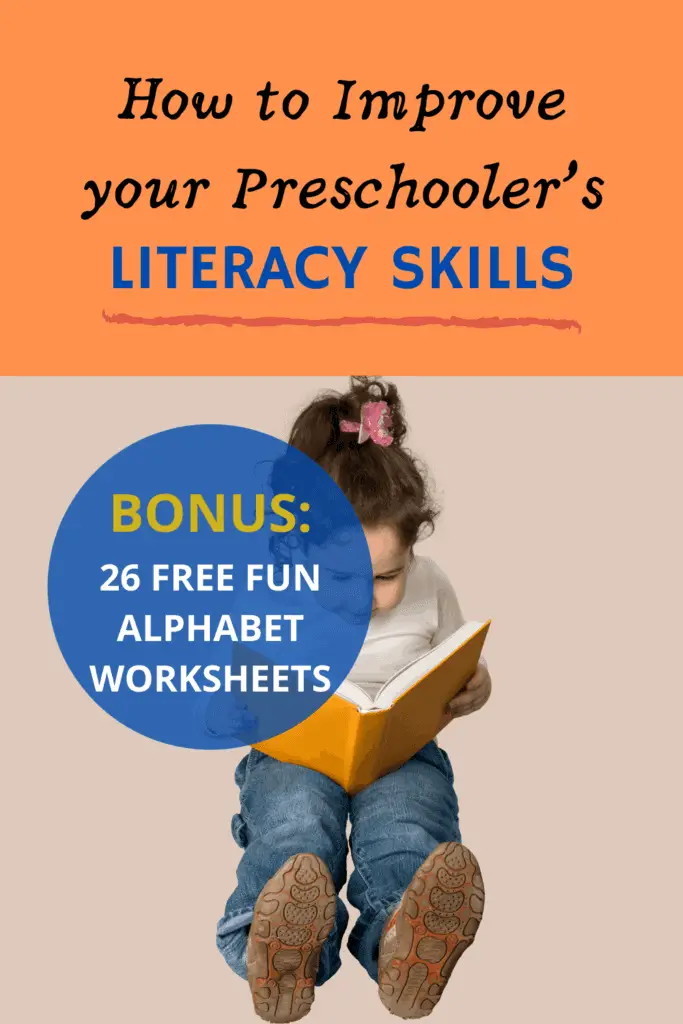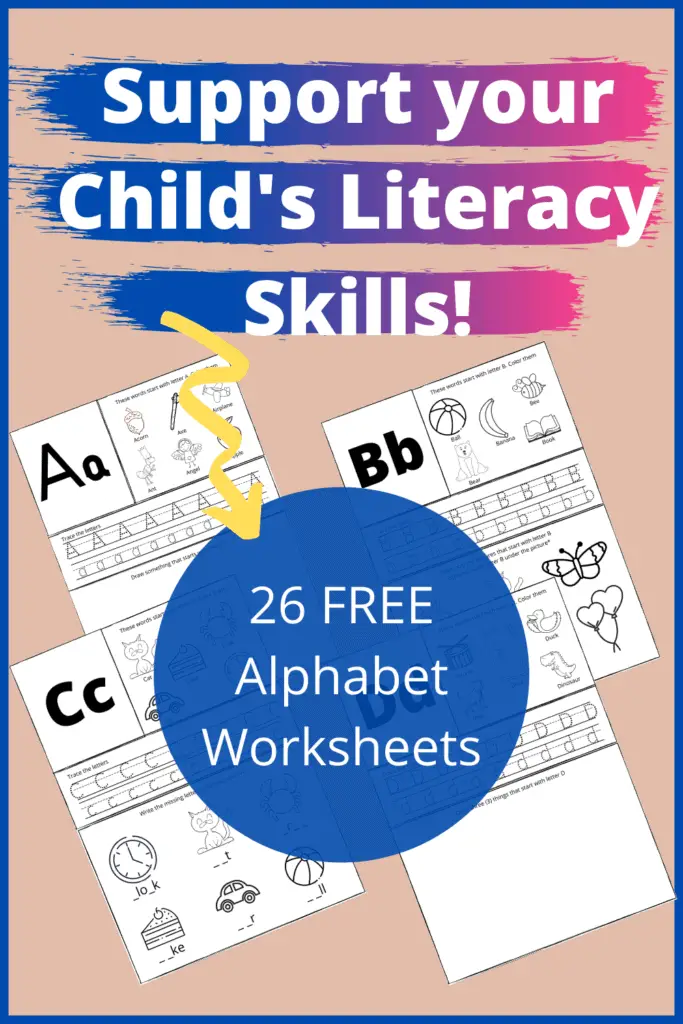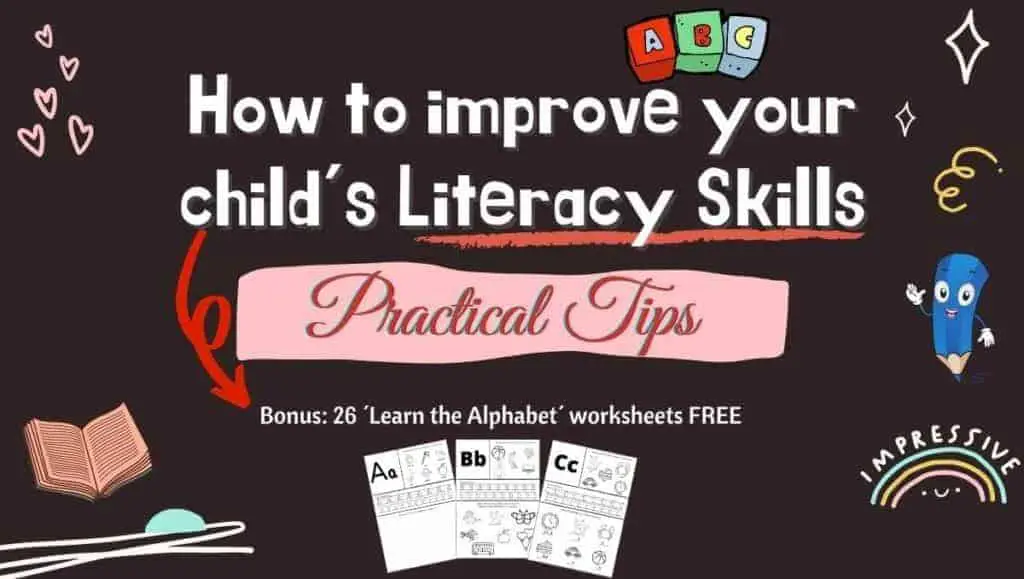Strong literacy skills are a vital component of high-quality life. In this post, you will discover the meaning of “emergent literacy skills”, the importance of literacy and what you can do, as a parent, to support your child’s literacy development at home.
My son is almost 3 years old now and he’s slowly starting to show interest in letters and written words. So, naturally, I want to nurture his curiosity in a playful way, allowing him to learn in his own natural rhythm.
There are many things that we, as parents, can do to support our children’s literacy development.
But before I share what we do at home to encourage my son’s literacy skills, what is the meaning of the term “emergent literacy skills”.

This post may contain affiliate links and I may earn a small commission when you click on the links at no additional cost to you. As an Amazon Affiliate, I earn from qualifying purchases. You can read my full disclosure here.
What does “emergent literacy” mean?
In a nutshell, emergent literacy refers to the behaviours of young children that gradually lead to reading and writing. It is quite a complex process that starts when children are born and they develop their language skills. Along with speech and language skills kids also acquire skills that are vital to literacy (reading and writing).
In this early literacy stage children develop phonological awareness and alphabet knowledge, they interact with the written word through books, magazines, street signs, etc, they manipulate objects related to literacy (pencils, pens, paper, books, erasers). All these experiences serve to prepare kids to read and write.
Even though early literacy skills develop naturally by being exposed to the spoken language, books, writing utensils, asking literacy-related questions and so on, there are still many things that we, as parents can do to support this process and give our children the best possible foundation.
Read more about Emergent Literacy Skills and their vital importance
Here are some of the best things that you can do with your child in order to support his/her emergent literacy skills.
How can we support our children’s emergent literacy skills?
According to the National Center on Improving Literacy, there are four key ways in which we can help our children’s literacy skills:
- Listening to them and making notes of the sounds or words that they are having difficulty with when talking.
- Watching them while performing various tasks and seeing which skills are challenging for them. Provide more practice for those specific skills and see if they improve with time.
- Provide help when needed by prompting and giving hints to your child. Help him figure things out himself with your support.
- Encourage your child to engage in literacy activities, offer praise when successful and reassurance when difficulties arise.
Here are some specific activities to improve a child’s literacy skills:
-
Read aloud
You will find the activity of reading to your child on most lists that discuss literacy in children. And with good reason. Exposing your child to books as early in their lives as possible will help them learn that printed words carry meaning and tell a story, they will link letters to their sounds, they will find new ways of saying things by enriching their vocabulary, they will discover new ideas and concepts, learn how books work and develop an enjoyment for reading.
The importance of reading to children has been stressed by the Journal of Developmental & Behavioral Pediatrics in a study published recently which shows that parents who read to their children at least one storybook a day, expose them to approximately 78,000 words each year. By the time the child turns 5, they will have been exposed to roughly 1.4 million words.
These are a few of our favourite books:
-
Listen to Nursery Rhymes
As with reading, exposure to nursery rhymes will teach young children about sounds. They will be exposed to a variety of words that they may not come across in their day-to-day interactions.
Children will become aware of the rhythm of language: pitch, volume and voice inflections.
Because nursery rhymes are short and repetitive, young children will remember them easily and will be able to reproduce them.
-
Talk to your child about everyday things
After my son was born I immediately started using a baby carrier wrap. They are the best thing ever as I could go about and do stuff around the house. My baby was happy and felt safe and I had two free hands, not to mention that I didn’t have to stop what I was doing every 5 minutes to check on him.
So, as I was doing everyday things, I made a point of verbalizing what I was doing. It felt funny at the beginning but then I got used to it.
Saying things like, “Look, I am putting on my shoes. Wow, look! I’ve got red shoes today” became a habit.
Constantly talking to your child is the first step to language acquisition and emergent literacy skills.
-
Expose your child to writing materials
As soon as your child can sit up, you can make various writing materials available and model how they should be used.
Pencils, crayons, chalk, paper, paint and paintbrushes are great materials for the little ones to practice their pre-writing skills.

-
Correcting mispronunciation
It is so cute when children mispronounce words, isn’t it? We may be tempted to pronounce the words in the same manner for fun. But it is important for kids to hear the correct pronunciation and sounds.
So, what we do is repeat what they said correctly. For example, “Mommy, eat pigetti, puiz?” Instead of saying “It’s pronounced spaghetti. Can you say spaghetti?” we can repeat the child’s sentence emphasizing the correct sounds in a natural way. “Of course, darling. I would like to EAT SPAGHETTI, too.”
-
Visit libraries, museums and educational groups for kids
Although much of the early education happens within the home and neighbourhood, visiting places that have high educational value will help the child broaden his horizon outside the familiarity of the home.
Libraries are a great place to support literacy skills as often they have different activities aimed at young children like story-reading sessions and various workshops.
Museums, with their unique exhibits, artifacts and written or oral explanations, are fantastic, positive environments to promote culture and literacy for young children.
Look for centers nearby that organize various workshops for children. Besides being fun and encouraging socialization among kids, they are also great for supporting early literacy.
-
Play Phonics Games
At around 3 years of age, (it varies from child to child) children start showing an interest in letters and sounds. Phonemic awareness is a vital skill that gives children the ability to recognize, hear and manipulate individual sounds that make up words. Through phonemic awareness, children understand that words can be broken down into sounds, for example, the word “pen” is made up of /p/ /e/ /n/. Being an auditory skill some children will automatically do better. But like any skill, phonemic awareness can be taught and practiced.
This is why playing phonics games is so important. Recently, I have started playing alliteration games with my son, which amuses him greatly and I am pleased that he repeats them. We are only doing short alliterations, like “baby blue balloon” or “tidy teddy”. Gradually we will progress to longer sentences.
If you are looking for phonics games to play with your toddler you can take a look here for inspiration.
-
Engage in activities and games that have high literacy value
Jean Piaget believed that “children come to understand concepts by engaging in play”. In a very interesting paper published in the Journal of Inquiry & Action in Education, the authors aptly conclude that “ children learn most by performance, not by prompt”.
This means that, although talking to your child about sounds and letters is very good, play-based learning and hands-on activities are the most effective for children to improve their literacy skills.
We have a great list of activities for practicing letter recognition with toddlers. The games are insanely fun, they involve a lot of movement and hands-on learning.
If you are looking for a quieter activity we have an amazing FREE 26 pages long Alphabet Worksheets Bundle. Each page is dedicated to one letter and has 4 sections:
- Letter Recognition- children see both the uppercase and the lowercase letter.
- Examples of words accompanied by pictures that start with that particular letter.
- Letter tracing- a great pre-writing activity that will not only teach children to write the letters but will practice their hand control, teach them to draw in a specific direction and the basic lines and curves that all letters are formed with.
- A fun activity that offers further practice- you will find activities like drawing something that starts with the target letter, letter fill-in, unscrambling the letters, connecting the image to the word or circling the correct image.
These worksheets are ideal for children with ages 3 and above. But remember that it varies from child to child and you should always take into consideration your child’s learning style and developmental stage. Most importantly, keep it fun.
We share all of our ideas, articles, activities with our children, important information we come across on our Facebook group Learning Activities for Kids. Join us and other like-minded parents and make parenthood easier!
Learning activities for kids

Mom of two wonderful children, dedicated teacher and book lover.




I love all your suggestions. They’re definitely helpful as they’re what got my toddler speaking without going to preschool or having any other kind of more structured help.
These are all great! I currently have a 2 1/2 year old and am always looking for new ways to teach him
Great ideas. My son is also almost three. I will be sure to use some of these suggestions. He was in speech therapy for a while and still mispronounces some words. I’ll be sure to work with him. Thanks!
LOVE these ideas! My 2 year old is a bit young for most of this, but it would be a great way to really introduce him to more letters and words!
These printables are a great resource for anyone homeschooling an early elementary student! Thank you for sharing them with your readers!
Very helpful post, your ideas will surely help toddlers to encourage their learning skills.
Super useful.
This post has so many great ideas! Thanks so much for sharing the background of why literacy skills are important for our littles and how we can improve this. I can’t wait to start using your tips with our little one! 🙂
I am so pleased that you found it useful, Danielle. Thank you for reading 🙂